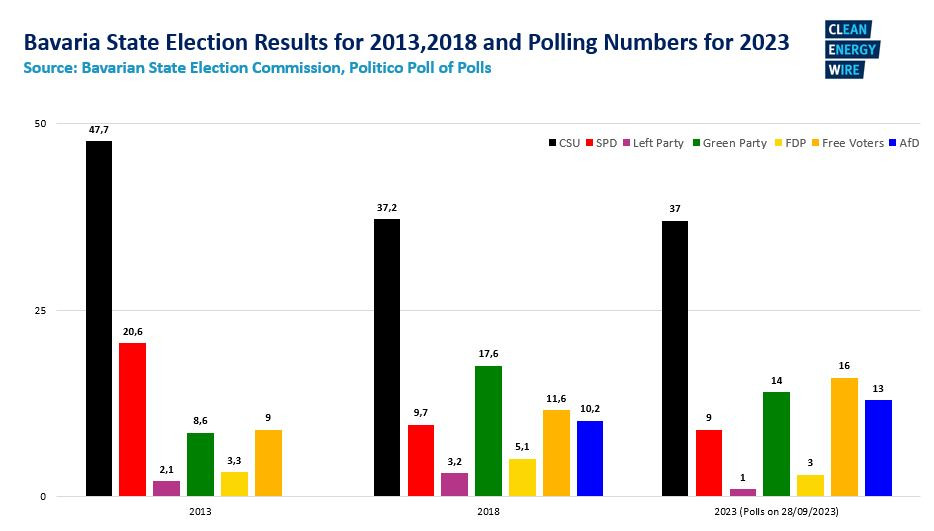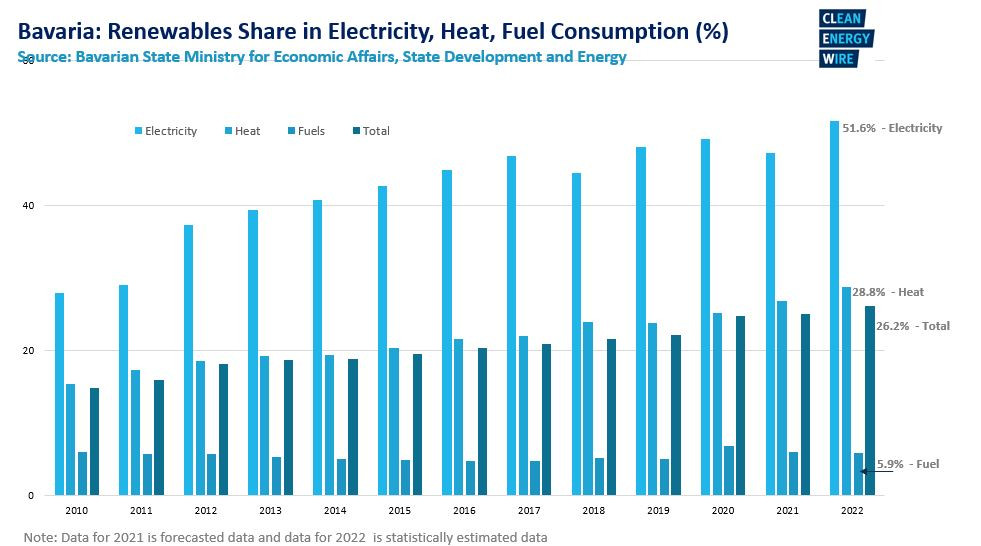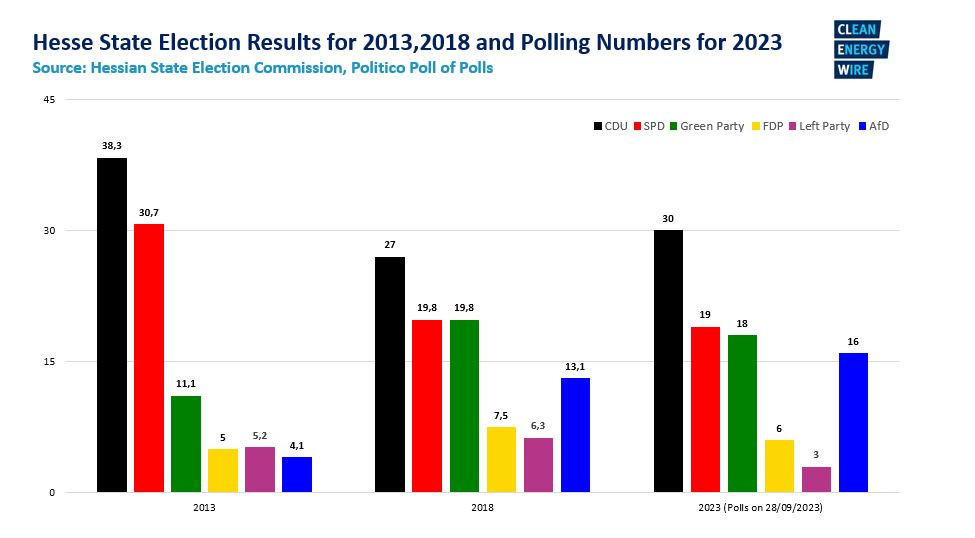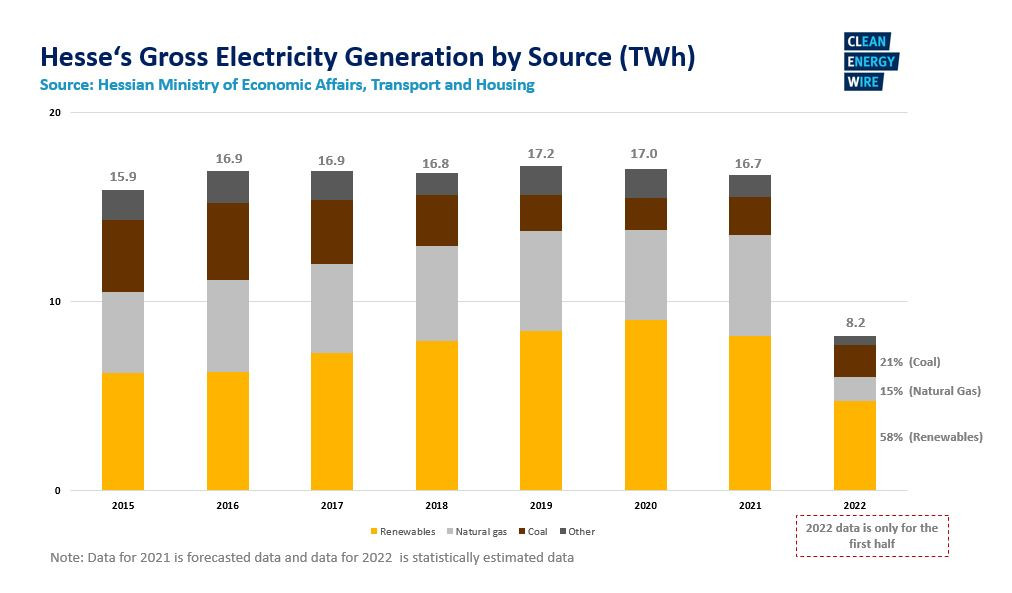Fears of populist climate policy backlash loom over Germany’s two southern state elections
Two years into the German government’s four-year term, two elections in the economic powerhouse states of Hesse and Bavaria act as a litmus test on the federal government’s popularity, even though regional issues will likely play an important role in voter decisions. The two states together account for more than a quarter of Germany’s economic output and nearly a quarter of the population. The elections come at a time when the coalition of chancellor Olaf Scholz is still grappling with the fallout of the energy crisis and Russia’s invasion of Ukraine, while trying to contain a surge in popularity of right-wing populists that has taken hold in several European countries.
Climate and energy policies figure high among the most relevant topics for voters on 8 October, but public discontent with the government’s work is increasingly seen as a threat to the coalition's ambitious climate policies. High energy prices plus regulatory measures implemented by the coalition of Scholz’s Social Democrats (SPD), the Green Party and the Free Democrats (FDP) to speed up the transition towards renewable power, electric vehicles, efficient buildings, and fossil-free heating have fuelled fears among many in the electorate that the path towards climate neutrality could come at a heavy cost to their own prosperity. During a summer marked by extreme weather and natural disaster news from around the world, tensions have risen about the pace and limits of government-led emission reductions. Radical climate protests have added further fuel to the controversies.
In light of a year dominated by high inflation, declining economic output and noisy political debates about acceptable costs for climate-friendly policies and the role of nuclear power, the state elections in the two southern states are overshadowed by a winning streak of the far-right Alternative for Germany (AfD) party. The populists have benefitted from voter fears over high prices and rising migration into the EU, readily exploiting grievances regarding energy policy decisions and Germany’s anti-Russia policies after the invasion of Ukraine. This strategy has proven particularly successful in the former communist eastern states, where the right-wing party now leads the polls, at around 30 percent. Resolutely railing against any decarbonisation efforts, the AfD is expected to make substantial gains in three eastern state elections (in Thuringia, Brandenburg and Saxony) next year. The party also hopes to benefit from the Europe-wide surge in populism at the 2024 European Parliament elections. While most people in the country continue to endorse ambitious climate policies, Germany's government and opposition parties not denying the need for action face the challenge of keeping the public on board while implementing policies that leave no one behind.
Renewables industry warns investors will shy away from regions with high AfD share
At election events for his SPD in Bavaria and Hesse, chancellor Scholz was loudly booed for spreading “climate lies” and “fuelling war” by bystanders that observers clearly linked to the AfD. At an event in Bavaria’s capital Munich in August, Scholz lashed out at the noisy protesters: “The right-wing populists are causing harm to our prosperity,” the chancellor said. “They represent a dark view of the future – and that’s also why they are in such a bad mood,” he argued, adding that accepting different views in a peaceful way constituted the basis of Germany’s democracy.
Already in July, the head of the renewables industry lobby group BEE, Simone Peter, warned that populist tendencies are becoming a threat to effective climate policies. Especially the highly charged dispute about Germany’s new heating law had shown that a “fair and solution-oriented” debate is only possible if other parties don’t join the AfD in their divisive approach. Renewable energy investors would shy away from cities and municipalities where the right-wing party has a say in local policymaking, Peter said.
The renewable power lobbyist’s view was mirrored by members of Germany’s Council of Economic Advisors (Wirtschaftsweise), a group of high-profile economists counselling the government on economic policy. Council head Monika Schnitzer said study results so far had shown that investors tend to shun populist-led regions, bearing the risk that eastern Germany isolates itself further from the more prosperous western parts of the country. While eastern coal regions like Lusatia face difficulties in the energy transition, other eastern regions rightfully hoped to make it a success, as for example the new microchip factory by U.S. company Intel near Magdeburg in Saxony-Anhalt had shown. “Regions with good infrastructure, skilled workers and green power can benefit,” she argued. Schnitzer’s colleague Veronika Grimm likewise said that populism in the East risks squandering the region’s high potential for becoming clean power production centres thanks to its low population density and dedicated research and infrastructure development in the past years.
Bavaria's populist Free Voters no enemy of energy transition - but of national climate policies
In southern state Bavaria and the western Hesse, the AfD is not steaming ahead as fast as in the east, polling somewhere around 15 percent. However, Scholz’s government coalition parties can still expect a severe blow. The incumbent conservative state premiers in both states, Markus Söder from the Christian Social Union (CSU) in Bavaria and Boris Rhein from the sister party Christian Democrats (CDU) in Hesse, are hopeful that they will remain in office.
In Bavaria, state premier Söder has ruled out any coalition with the state’s Greens. Despite repeatedly polling second in the affluent state bordering the Alps, the ecological party “and its view of the world don’t fit in Bavaria,” the conservative state premier said. “Under no circumstances” would he enter talks with the Greens, Söder said, adding that the conservatives remained determined to boot out Scholz’s ‘traffic light’ coalition, “Germany’s worst government ever,” in the 2025 national elections.
Meanwhile, Söder appears ready to continue his partnership with the moderate right-wing populist Free Voter party, whose top candidate, economy minister Hubert Aiwanger, recently made national headlines with a document found in his school bag as a teenager in the 1980s that mocked the atrocities committed by the German Nazi government in the Holocaust. The minister denied authorship of the pamphlet and instead called it a targeted attack on his party, a response that only boosted the Free Voters in polls. Faced with unwavering support for Aiwanger amidst the national scandal, Söder kept the alliance with Free Voters intact.
In contrast to the AfD, Aiwanger’s party does not reject climate action and energy transition policies per se, with the economy minister constantly praising the benefits of renewables for Bavaria’s many farmers and rural communities. However, in the run-up to the election, the minister also threw his state’s 2040 climate neutrality target into question, arguing “I don’t know if we will meet it” but ruling out “dictatorial” measures to ensure it. With this, the agricultural engineer from a farming background has lashed out at the national government in Berlin, particularly at the Greens, claiming “a silent majority” of voters should get ready to “take back democracy.” After causing a backlash among a majority of voters, Aiwanger later said he simply aimed to keep people from voting for the AfD, which polls close to his own party. At the same time, Scholz’s SPD is likely looking at a single-digit while the pro-business FDP might even fail to get across the 5-percent threshold to enter parliament.
Regarding Bavaria’s climate action and energy transition credentials, the state has successfully maintained its leading position as solar power and bioenergy producer in the country, benefitting from a large agricultural sector and sunny weather. However, industry groups and local mayors in Bavaria have repeatedly criticised Söder’s and Aiwanger’s coalition for not being resolute enough in the transition to renewables. They urged the government to lift restrictions on wind power construction, particularly since the loss of Russian gas and the nuclear and coal phase outs have hit the state’s heavy industry, which features heavyweights such as BMW, Audi and Siemens, harder than many others in Germany.
This is not least due to the fact that Bavaria, which is under CSU rule since the state’s founding, has been among the most tenacious critics and blockers of a national power transmission line supplying southern Germany with wind power from the north, a project that many landowners want to turn into a reliable source of income.
Green top candidate in Hesse calls federal government "circus show"
In Hesse, a centrally located state that serves as a hub for transport, trade and finance in Germany, the Greens under popular top candidate and economy minister Tarek Al-Wazir, can hope to continue their coalition with state premier Rhein’s CDU. Even though he trails Rhein in polls by a considerable margin, Al-Wazir even has not given up on the hope to become state premier in a different coalition himself. In a bid to distance himself from the disputes of the national government coalition, he ensured voters in an interview that “a circus show” like the one his own Green Party is part of in the national government in Berlin “will not happen with me.”
For this, Al-Wazir might need the support of SPD candidate Nancy Faeser, who currently serves as minister for the interior in Scholz’s federal government – and has led a rather hapless campaign placing her party almost on par with the Greens in polls. The FDP, another possible partner for Al-Wazir’s ambitions, polls slightly above the 5-percent barrier.
With no Free Voters party in parliament, the AfD is the go-to option for protest and right-wing voters in Hesse. The party rejected CO2 reduction measures, instead favouring an expansion of the state’s motorways and exemptions for the large Frankfurt Airport from duties entailed in EU climate policies in its election programme.
"Firewall" of conservative against AfD will face tough tests in 2024
Consequently, one of the state party’s main slogan reads “Stop Green Policies.” At the same time, a quarter of voters in Hesse in a survey said energy and climate are the most important topics for their voting decision, the largest share for any topic. Despite this high relevance of energy transition topics, the state ranks poorly in both wind and solar power deployment, even as the rate of expansion has accelerated in the past legislative period.
Boris Rhein, who inherited state premier’s office in Hesse from a parting CDU predecessor in 2022 without having to have himself elected, said instead of constantly talking about keeping the AfD in check, the other parties ought to focus on solving issues that voters care about, including “economic growth, losses in prosperity and energy.”
Like Söder in Bavaria, Rhein ruled out cooperating with the far-right “protest party.” However, it remains unclear whether other conservative leaders will keep the same rigorous rejection of the AfD in the 2024 eastern state elections. Since a state CDU branch in Thuringia recently joined forces with the populist group for the first time to get a bill through parliament, observers have warned that the “firewall” conservative parties in the country have promised to uphold against their far-right competitors might not hold indefinitely.






